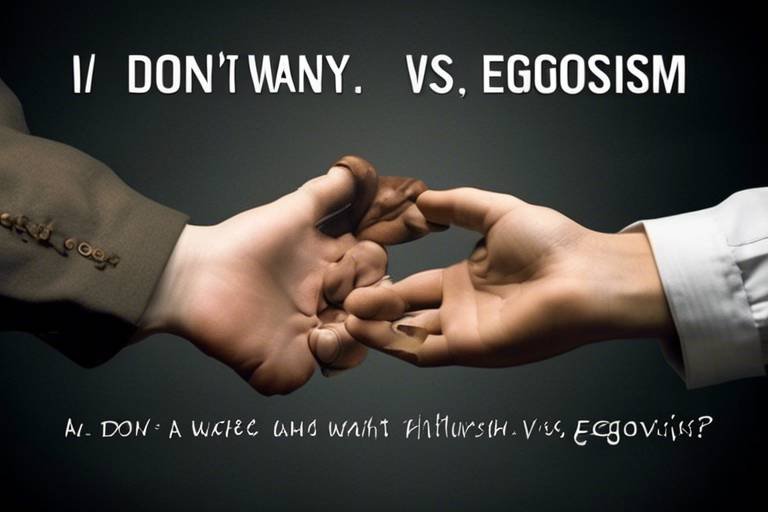Solitude and Loneliness - A Philosophical Perspective
This article explores the nuanced differences between solitude and loneliness, examining their implications on the human experience through a philosophical lens that highlights their emotional and existential significance. In a world that often equates being alone with feeling isolated, it’s essential to dissect these concepts to understand how they affect our lives. Are we truly alone when we find ourselves in solitude, or are we merely lonely in a crowded room? This exploration invites you to reflect on your own experiences and perceptions of these profound states of being.
Solitude is often seen as a positive state, providing opportunities for self-reflection and personal growth. It’s a time when we can peel back the layers of our busy lives and connect with our inner selves, free from the distractions of the outside world. Imagine a serene lake, untouched by the chaos of life; that’s what solitude can feel like—a peaceful retreat where thoughts can flow freely. Philosophically, solitude is not just about being alone; it’s about embracing the silence and using it as a canvas for self-discovery. It allows us to confront our thoughts, question our beliefs, and ultimately, understand our place in the universe.
Loneliness, in contrast, is frequently viewed negatively. It’s that gnawing feeling that creeps in when we are surrounded by others yet feel disconnected. Think of loneliness as a dark cloud that looms over you, casting shadows on even the brightest days. This emotional pain can be profound, impacting our mental well-being and leading to feelings of despair. Philosophically, loneliness prompts us to question the nature of our connections with others. Are we truly connecting, or are we merely coexisting? The implications of loneliness stretch far beyond the individual, affecting society as a whole and raising questions about our collective human experience.
Throughout history, various philosophers have celebrated solitude as a means of achieving deeper understanding. Figures such as Henry David Thoreau and Friedrich Nietzsche have articulated the value of solitude in personal development. Thoreau, for instance, famously retreated to the woods to live deliberately, suggesting that solitude is essential for clarity and insight. Nietzsche, on the other hand, viewed solitude as a crucible for creativity and strength. Their insights remind us that solitude can be a powerful teacher, offering lessons that are often obscured in the noise of everyday life.
Existentialist philosophers emphasize the importance of solitude in confronting the absurdity of life. For them, solitude is not merely a state of being alone; it’s a necessary condition for authentic existence. When stripped of societal expectations and distractions, individuals can engage in profound self-examination. This process can lead to a deeper understanding of one’s purpose and identity. Solitude, then, becomes a pathway to self-discovery, where one can grapple with fundamental questions about existence and meaning.
Romantic philosophers and poets often portrayed solitude as a source of inspiration and creativity. They viewed moments of isolation as fertile ground for artistic expression. Think of the works of William Wordsworth or Emily Dickinson, who found beauty in their solitary moments. Their writings suggest that solitude can ignite the imagination, allowing the mind to wander and explore new ideas. In this light, solitude is not just a state of being; it’s a vital ingredient in the creative process, fostering innovation and originality.
In contemporary times, loneliness has become a pervasive issue. The rise of urbanization and digital communication has paradoxically increased feelings of isolation. Many people live in bustling cities yet feel profoundly alone. This societal shift raises important philosophical questions: What does it mean to connect in a digital age? Are our online interactions genuine, or do they merely serve as a facade? The implications of loneliness in modern society are significant, challenging us to redefine our understanding of connection and community.
This section reflects on the philosophical significance of human connection, contrasting it with solitude and loneliness, and exploring how relationships shape our understanding of self and existence. Connection with others can serve as a balm for loneliness, reminding us that we are not alone in our experiences. It’s through these relationships that we find meaning and purpose, enriching our lives and fostering a sense of belonging.
Examining the role of interpersonal relationships, we find that meaningful connections can alleviate loneliness and enrich the experience of solitude. When we share our thoughts and feelings with others, we create bonds that foster understanding and empathy. These connections remind us that we are part of a larger tapestry of human experience, where each thread contributes to the whole. In this way, solitude can be a companion to connection, allowing us to appreciate our relationships even more.
With the rise of technology, loneliness has taken on new dimensions. Digital interactions can sometimes feel hollow, lacking the warmth of face-to-face communication. As we navigate this landscape, it’s crucial to consider how our online lives impact our sense of solitude and connection. Are we using technology to enhance our relationships, or are we allowing it to deepen our loneliness? This analysis invites us to reflect on our digital habits and their philosophical implications for our well-being.
- What is the difference between solitude and loneliness? Solitude is a chosen state of being alone, often associated with self-reflection and personal growth, while loneliness is an involuntary feeling of isolation and disconnection.
- Can solitude be beneficial? Yes, solitude can provide opportunities for self-discovery, creativity, and deeper understanding of oneself.
- How does modern technology affect loneliness? While technology can connect us, it can also create superficial interactions that may lead to feelings of loneliness.

The Nature of Solitude
Solitude is a complex and multifaceted state that can be both enriching and transformative. Unlike loneliness, which often comes with a sense of isolation and despair, solitude can be viewed as a sanctuary—a place where one can retreat from the chaos of the world and engage in deep self-reflection. Imagine solitude as a personal oasis; a quiet space where the mind can wander freely, allowing thoughts to flow like water in a serene stream. This state of being is not merely about being alone; it is about embracing the stillness and finding comfort in one's own company.
Philosophically, solitude has been celebrated as a vital component of personal growth and self-discovery. It offers individuals the chance to step back from societal expectations and external pressures, leading to a deeper understanding of oneself. In solitude, one can ponder life’s big questions: Who am I? What do I truly desire? What is my purpose? These moments of introspection can lead to profound insights, fostering a sense of clarity that is often obscured by the noise of daily life.
Moreover, solitude can enhance creativity and productivity. Many artists, writers, and thinkers have sought out solitude as a means to unlock their creative potential. When the distractions of the outside world fade away, the mind can delve into the depths of imagination, producing works that resonate on a universal level. Consider the famous quote by Henry David Thoreau: “I never found the companion that was so companionable as solitude.” This reflects the idea that solitude can be a powerful ally in the quest for originality and inspiration.
However, it’s essential to recognize that the experience of solitude can vary greatly from person to person. For some, it is a peaceful retreat; for others, it can feel daunting and uncomfortable. This duality is what makes solitude so intriguing. It is a reminder that our perceptions shape our experiences. In this sense, solitude can be seen as a mirror reflecting our innermost thoughts and feelings. When we choose to embrace it, we may uncover hidden aspects of ourselves that we never knew existed.
In summary, the nature of solitude is deeply intertwined with our emotional and existential journey. It offers a unique opportunity for self-exploration, creativity, and personal growth. By understanding and appreciating solitude, we can better navigate our lives, finding balance between connection and introspection. As we delve deeper into this philosophical exploration, we will uncover how solitude differs from loneliness and the profound implications each state holds for the human experience.

The Essence of Loneliness
Loneliness is a complex and often painful experience that many of us encounter at various points in our lives. Unlike solitude, which can be a nurturing space for self-discovery and reflection, loneliness is marked by a profound sense of isolation and disconnection from others. It’s as if you’re standing in a crowded room, yet no one can see or hear you. This emotional state can lead to feelings of sadness, anxiety, and even despair. But what exactly makes loneliness so heavy? Let’s dive deeper into its essence.
At its core, loneliness is not merely the absence of social interaction; it’s the feeling of being emotionally detached from those around us. It can arise from a variety of circumstances, such as:
- Loss of a loved one
- Moving to a new place
- Ending a significant relationship
- Experiencing life transitions, like retirement or becoming an empty nester
This emotional pain is not just a fleeting feeling; it can have long-lasting effects on mental and physical health. Studies have shown that chronic loneliness can lead to serious health issues, such as:
| Health Issue | Impact |
|---|---|
| Depression | Increased feelings of sadness and hopelessness |
| Anxiety | Heightened sense of worry and fear |
| Cardiovascular Problems | Higher risk of heart disease and hypertension |
| Weakened Immune System | Increased susceptibility to illness |
Philosophically, loneliness can be viewed as an existential crisis. It prompts us to question our place in the world and the meaning of our existence. Many thinkers have grappled with the nature of loneliness, suggesting that it serves as a mirror reflecting our deepest fears and desires. It’s a reminder of our inherent need for connection and belonging. The absence of these connections can lead to a feeling of emptiness, as if we are wandering through life without a compass.
Moreover, loneliness can be a catalyst for profound personal growth. When we confront the depths of our solitude, we may uncover hidden strengths and insights. It can force us to reevaluate our relationships and priorities, ultimately leading to a more authentic existence. However, this journey is not easy; it requires courage and vulnerability to face the uncomfortable truths that loneliness can reveal.
In a world that increasingly values connectivity, loneliness remains a poignant reminder of the human condition. It challenges us to seek deeper connections and to cultivate meaningful relationships. As we navigate our lives, it’s essential to recognize the difference between solitude and loneliness, embracing the former while striving to alleviate the latter. After all, understanding the essence of loneliness is the first step toward transforming it into a more enriching experience.

Historical Perspectives on Solitude
Throughout the ages, solitude has been a subject of fascination and contemplation for many great thinkers. It is intriguing how different eras and philosophies have shaped our understanding of this state of being. The ancient philosophers, for instance, often viewed solitude as a pathway to enlightenment and self-awareness. Socrates famously proclaimed, “The unexamined life is not worth living,” suggesting that moments of solitude are essential for introspection and personal growth.
Moving into the medieval period, solitude took on a more spiritual dimension. Christian mystics, such as St. Augustine and St. Teresa of Avila, emphasized the importance of withdrawing from the world to connect with the divine. They believed that solitude allowed individuals to transcend worldly distractions and cultivate a deeper relationship with God. This perspective highlights how solitude can serve as a sanctuary for spiritual rejuvenation.
As we transition into the Renaissance, we see a shift in the perception of solitude. Thinkers like Michel de Montaigne celebrated the idea of being alone, viewing it as a necessary condition for creativity and intellectual pursuits. Montaigne’s essays often reflect on the joys of solitary contemplation, suggesting that it fosters a fertile ground for original thought. In his words, “The greatest thing in the world is to know how to belong to oneself.”
In the Romantic era, solitude was romanticized and became a source of inspiration for poets and artists. Figures such as William Wordsworth and John Keats portrayed solitude as a muse, a space where the soul could connect with nature and the sublime. Wordsworth’s poetry often reflects the beauty of solitary walks in nature, illustrating how such experiences can lead to profound insights and emotional clarity. This period marked a significant cultural shift, where solitude was not merely a state to endure but a powerful experience to embrace.
In the 20th century, existentialist philosophers like Jean-Paul Sartre and Martin Heidegger examined solitude through a more critical lens. They argued that solitude is essential for confronting the absurdity of existence. For Sartre, being alone forces individuals to grapple with their freedom and the weight of their choices. Heidegger, on the other hand, posited that solitude allows for authentic existence, where one can truly confront the essence of being. This existential perspective underscores solitude as a double-edged sword—while it can lead to profound self-discovery, it can also evoke feelings of despair and isolation.
To summarize the historical perspectives on solitude, we can look at the following table, which highlights key thinkers and their contributions:
| Philosopher | Era | Perspective on Solitude |
|---|---|---|
| Socrates | Ancient | Essential for introspection and self-examination |
| St. Augustine | Medieval | Spiritual connection with the divine |
| Montaigne | Renaissance | Fosters creativity and original thought |
| Wordsworth | Romantic | Source of inspiration and emotional clarity |
| Sartre | 20th Century | Confronting freedom and existence |
In conclusion, the historical perspectives on solitude offer a rich tapestry of insights that reveal its complex nature. From spiritual retreats to creative musings, solitude has been both celebrated and critiqued across different philosophical landscapes. Understanding these perspectives not only enriches our appreciation for solitude but also encourages us to reflect on our personal experiences with it.
- What is the difference between solitude and loneliness? Solitude is often a chosen state that allows for self-reflection and personal growth, while loneliness is typically an unwanted feeling of isolation.
- Can solitude be beneficial? Yes, solitude can foster creativity, self-awareness, and emotional clarity, making it a valuable experience for many individuals.
- How have philosophers historically viewed solitude? Philosophers have viewed solitude in various ways, from a means of spiritual connection to a pathway for authentic existence and creativity.

Existentialist Views
Existentialist philosophy, with its roots deeply embedded in the works of thinkers like Jean-Paul Sartre, Simone de Beauvoir, and Albert Camus, places a profound emphasis on the concept of solitude. For existentialists, solitude is not merely a state of being alone; rather, it is a vital condition for confronting the **absurdity** of existence. In essence, it is through solitude that one can engage in the **introspection** necessary to grapple with life's inherent meaninglessness. This philosophical perspective asserts that solitude can lead to a more **authentic existence**, where individuals are free to explore their true selves, unencumbered by societal expectations and the demands of others.
In the existentialist view, embracing solitude allows individuals to confront the **existential dilemmas** that life presents. It is in these moments of quiet reflection that one can ask the tough questions: Who am I? What do I truly value? What is my purpose? This process of self-examination is crucial, as it leads to a deeper understanding of oneself and one's place in the world. The existentialist perspective posits that without solitude, individuals may fall into the trap of **inauthenticity**, living lives dictated by external influences rather than their own choices.
Moreover, existentialists argue that solitude is a double-edged sword. While it can be a source of profound insight and personal growth, it can also lead to feelings of isolation and despair if one is not prepared to face the truths that arise in silence. This paradox is beautifully captured in Camus's notion of the **absurd hero**, who, despite recognizing the futility of life, chooses to live fully and passionately. Thus, solitude becomes a space for embracing one's freedom and the responsibility that comes with it.
To illustrate these ideas, consider the following table that summarizes key existentialist thinkers and their views on solitude:
| Philosopher | Key Insight on Solitude |
|---|---|
| Jean-Paul Sartre | Solitude allows individuals to confront their freedom and the weight of their choices. |
| Simone de Beauvoir | Solitude can be empowering, enabling self-discovery and personal authenticity. |
| Albert Camus | Embracing solitude is essential for recognizing the absurdity of life and living authentically. |
In conclusion, the existentialist perspective on solitude underscores its complexity as both a **pathway to self-discovery** and a potential source of anguish. By embracing solitude, individuals can engage with their inner selves, confront the existential questions that define human existence, and ultimately carve out a more authentic path in life. This philosophical lens invites us to reconsider our relationship with solitude, not merely as a state of loneliness but as an essential component of the human experience.
- What is the difference between solitude and loneliness? Solitude is a chosen state of being alone that can lead to personal growth, while loneliness is often an involuntary feeling of isolation.
- How can solitude benefit personal development? Solitude allows for self-reflection, creativity, and deeper understanding of one's values and purpose.
- Can solitude lead to negative feelings? Yes, if not approached mindfully, solitude can lead to feelings of isolation and despair.
- How do existentialists view human connection? While they value solitude for self-discovery, existentialists also recognize the importance of meaningful connections in shaping our identities.

Romanticism and Solitude
The Romantic era, spanning from the late 18th to the mid-19th century, was a time when the world saw a profound shift in artistic and philosophical thought. It was a period that celebrated the individual, emotion, and the beauty of nature, often intertwining these themes with the concept of solitude. For many Romantic poets and philosophers, solitude was not merely a state of being alone; it was a sacred space that fostered creativity and introspection. The likes of William Wordsworth and John Keats often found inspiration in the quietude of nature, using their solitary moments to delve deep into their thoughts and emotions.
In this context, solitude is portrayed as a canvas where the soul can paint its deepest desires, fears, and dreams. Wordsworth, for instance, famously wrote about the beauty of solitary walks in the Lake District, suggesting that these moments of isolation could lead to profound insights and a heightened sense of self-awareness. He believed that by stepping away from the clamor of society, one could truly connect with the essence of life itself. This perspective echoes the idea that solitude is not just about being physically alone; it’s about creating a mental space that allows for reflection and creativity.
Moreover, Romanticism often romanticized the notion of the 'tortured artist,' where solitude was seen as a necessary condition for artistic genius. Poets and writers like Emily Dickinson and Lord Byron embraced their solitary lives, channeling their emotional struggles into their work. The act of writing became a means of grappling with their inner turmoil, suggesting that solitude can serve as a crucible for artistic expression. In this way, solitude is depicted not as a void to be feared, but rather as a fertile ground for creativity and self-discovery.
However, it is important to recognize that while Romanticism glorifies solitude, it also acknowledges its complexities. The very same solitude that inspires can also lead to feelings of isolation and despair. This duality is evident in the works of many Romantic poets who grappled with their emotions. For instance, the melancholic tones in some of Byron’s poetry reveal a deep sense of longing and loss that often accompanies solitude. Thus, while solitude can be a source of inspiration, it can also evoke profound feelings of loneliness and existential questioning.
In essence, the Romantic view of solitude is multifaceted. It is a space for introspection, a wellspring of creativity, and at times, a battleground for the soul. This nuanced understanding invites us to reflect on our own experiences with solitude. Are we using our solitary moments to connect with our inner selves, or do we find ourselves overwhelmed by the silence? The Romantic legacy teaches us that solitude can be both a gift and a challenge, urging us to embrace it with awareness and intention.
- What is the difference between solitude and loneliness? Solitude is a voluntary state of being alone that can lead to self-discovery and creativity, while loneliness is an involuntary feeling of isolation that often leads to emotional pain.
- How did Romantic poets view solitude? Romantic poets viewed solitude as a source of inspiration and a necessary condition for artistic expression, often using their solitary moments to explore their emotions and creativity.
- Can solitude be beneficial? Yes, solitude can provide opportunities for self-reflection, personal growth, and creativity, allowing individuals to connect with their inner thoughts and feelings.
- What are some negative aspects of solitude? While solitude can be enriching, it can also lead to feelings of loneliness, despair, or existential questioning if not approached mindfully.

Loneliness in Modern Society
In today's fast-paced world, the feeling of loneliness has become alarmingly prevalent, almost like a shadow lurking behind the bright screens of our digital lives. While technology has connected us in unprecedented ways, it has also fostered a paradoxical sense of isolation. Have you ever scrolled through social media, surrounded by posts of smiling faces, yet felt a profound sense of emptiness? This dissonance illustrates how the very tools designed to bring us together can sometimes amplify our feelings of solitude.
Modern society, with its relentless hustle and bustle, often prioritizes productivity over genuine human connection. People are busier than ever, racing from one obligation to the next, often neglecting the importance of nurturing relationships. The irony is that while we are more "connected" than ever, many individuals report feeling more isolated. According to recent studies, a significant percentage of adults experience chronic loneliness, which can lead to serious mental health issues such as depression and anxiety. The following table highlights some key statistics on loneliness in modern society:
| Statistic | Percentage |
|---|---|
| Adults who report feeling lonely | 61% |
| Impact of loneliness on mental health | 50% |
| Young adults (18-24) feeling lonely | 79% |
But what causes this pervasive loneliness? Several societal factors contribute to this phenomenon:
- Urbanization: As more people flock to cities for opportunities, the sense of community that once thrived in smaller towns diminishes.
- Digital Communication: While texting and social media can maintain connections, they often lack the depth and warmth of face-to-face interactions.
- Work Culture: The rise of remote work, while beneficial in many ways, can lead to feelings of isolation when colleagues are no longer physically present.
Philosophically, this raises important questions about the nature of our existence. Are we truly connecting with others, or are we merely existing in parallel? The existentialists remind us that authentic connections are essential for a fulfilling life. When we experience loneliness, it often serves as a stark reminder of our need for meaningful relationships. It is in these connections that we find our sense of self and belonging.
Moreover, loneliness can act as a catalyst for self-reflection. It forces us to confront our inner worlds, prompting questions about what we truly value in our relationships. In a society that often glorifies busyness, perhaps it's time to pause and consider: Are we sacrificing genuine connection for the sake of productivity?
As we navigate this complex landscape of modern loneliness, it becomes crucial to cultivate spaces for authentic interactions. Whether it's through community events, shared hobbies, or simply reaching out to a friend for a chat, taking proactive steps can help bridge the gap of isolation. After all, the human experience is enriched not just by our solitary moments, but by the connections we forge with others.

Philosophical Reflections on Connection
Connection is an intrinsic part of the human experience, one that shapes our identities and influences our emotional landscapes. Philosophically speaking, the act of connecting with others goes beyond mere interaction; it becomes a profound exploration of our existence. Just as a tree needs roots to grow strong, we too require connections to flourish. But what does it mean to truly connect? Is it merely the absence of loneliness, or is there something deeper at play?
When we delve into the philosophical significance of connection, we find that it serves as a mirror reflecting our innermost selves. Through our interactions, we not only share our thoughts and feelings but also discover who we are. This can be likened to a dance; while one partner leads, the other follows, and together they create a rhythm that reflects their unique relationship. In this way, meaningful connections can alleviate feelings of loneliness and enrich our experiences of solitude, allowing us to grow and evolve.
Moreover, the quality of our connections plays a pivotal role in how we perceive ourselves and our place in the world. Consider the following aspects:
- Empathy: The ability to understand and share the feelings of another fosters deeper connections, enhancing our emotional well-being.
- Trust: Building trust allows relationships to flourish, creating a safe space for vulnerability and openness.
- Shared Experiences: Engaging in shared activities or interests can strengthen bonds and create lasting memories.
In essence, these connections help us navigate the complexities of life, providing support during challenging times and celebrating our joys. However, it’s essential to recognize that not all connections are created equal. Some may be superficial, lacking the depth needed to truly enrich our lives. These fleeting interactions can sometimes lead to feelings of isolation, even in a crowded room. This paradox emphasizes the need for authentic relationships that resonate on a deeper level.
As we explore the philosophical implications of connection, we must also consider the impact of modern technology. In an age where social media platforms and digital communication dominate our interactions, the nature of connection has evolved. While technology can facilitate communication, it can also create a façade of connection that leaves many feeling more isolated than ever. The irony is palpable: as we become more connected digitally, we may find ourselves more disconnected emotionally. This raises a critical question: Are we sacrificing genuine connections for the convenience of digital interactions?
Ultimately, the philosophical reflections on connection remind us that while solitude can be a source of personal growth, it is the connections we forge with others that enrich our lives and shape our understanding of existence. Just as a painter requires a canvas to express their creativity, we need relationships to fully explore the depths of our humanity. In the end, it is this intricate dance of connection that gives meaning to our lives, allowing us to navigate the complexities of the human experience with grace and understanding.
- What is the difference between solitude and loneliness?
Solitude is a chosen state of being alone that can lead to personal growth, while loneliness is often an involuntary feeling of isolation that can result in emotional pain.
- How can I cultivate meaningful connections?
Focus on building trust and empathy in your relationships, engage in shared activities, and prioritize open communication.
- Can technology help reduce loneliness?
While technology can facilitate connections, it is essential to seek authentic relationships rather than rely solely on digital interactions.

Interpersonal Relationships
Interpersonal relationships are the threads that weave the fabric of our existence. They are not just connections; they are the lifelines that sustain us through the ebbs and flows of life. Think about it: when you’re feeling down or overwhelmed, who do you turn to? The answer is often a friend, a family member, or even a colleague. These relationships provide us with a sense of belonging and understanding, which can be a powerful antidote to feelings of loneliness. In a world where solitude can sometimes feel heavy and burdensome, the warmth of human connection can lift us, offering solace and support.
Moreover, the quality of our interpersonal relationships directly impacts our mental and emotional well-being. When we engage in meaningful conversations and share experiences with others, we create bonds that not only enrich our lives but also contribute significantly to our self-identity. It’s fascinating to consider how these connections shape our perspectives and influence our thoughts. For instance, when you share your dreams and aspirations with someone who truly listens, it can ignite a spark of motivation within you. This is the beauty of interpersonal relationships—they can transform solitude into a productive and enriching experience.
However, it's essential to recognize that not all relationships are created equal. Some connections can be superficial, leaving us feeling more isolated than ever. This is where the distinction between mere acquaintances and genuine friendships becomes crucial. Genuine relationships are characterized by mutual respect, empathy, and understanding. They provide a safe space where individuals can express themselves without fear of judgment. In contrast, superficial relationships often lack depth and can exacerbate feelings of loneliness, as they do not fulfill our innate need for connection.
To truly appreciate the significance of interpersonal relationships, let’s consider a few key elements that contribute to their strength:
- Communication: Open and honest communication is the cornerstone of any strong relationship. It fosters trust and understanding, allowing individuals to feel heard and valued.
- Empathy: The ability to put oneself in another's shoes cultivates deeper connections. Empathy allows us to resonate with others' feelings and experiences, creating a bond that goes beyond superficial interactions.
- Support: Being there for one another during tough times strengthens relationships. Support can manifest in various forms, from offering a listening ear to providing practical help.
In essence, interpersonal relationships are vital not only for alleviating loneliness but also for enhancing our experience of solitude. They remind us that even in our moments of solitude, we are never truly alone. The memories and connections we share with others linger in our hearts, providing comfort and joy. So, the next time you find yourself in a quiet moment, reflect on the relationships that enrich your life. They may just be the key to transforming solitude into a profound journey of self-discovery and growth.
- What is the difference between solitude and loneliness?
Solitude is a chosen state of being alone, often associated with self-reflection and personal growth, while loneliness is an emotional response to feeling disconnected from others. - How can I improve my interpersonal relationships?
Improving interpersonal relationships involves enhancing communication, practicing empathy, and providing mutual support to one another. - Can solitude be beneficial for mental health?
Yes, solitude can be beneficial as it allows for self-reflection, creativity, and personal growth, contributing positively to mental health. - What role does technology play in interpersonal relationships?
Technology can both enhance and hinder interpersonal relationships; while it allows for easier communication, it can also lead to superficial connections if not used mindfully.

Technology and Loneliness
In our fast-paced, digitally-driven world, technology has become an integral part of our daily lives. While it offers unparalleled convenience and connectivity, it also presents a paradox that many of us are grappling with: the relationship between technology and loneliness. Have you ever scrolled through your social media feed, surrounded by images of friends and family, yet felt an overwhelming sense of isolation? This phenomenon is not uncommon and raises significant questions about the nature of our connections in the digital age.
One of the most striking aspects of technology is its ability to create a facade of connection. We can chat with friends across the globe, share our thoughts instantly, and even participate in virtual gatherings. However, these interactions often lack the depth and emotional resonance found in face-to-face conversations. As we substitute genuine human contact with digital interactions, we may inadvertently foster feelings of loneliness, as the warmth of physical presence is replaced by the coldness of a screen.
Moreover, the constant barrage of curated lives on social media can exacerbate feelings of inadequacy and isolation. When we compare our behind-the-scenes reality to the highlight reels presented by others, it can lead to a sense of disconnection. This comparison trap can leave us feeling lonely, even when we are surrounded by a virtual community. Research has shown that increased social media use is often correlated with heightened feelings of loneliness, creating a cycle that is difficult to escape.
Interestingly, technology also has the potential to combat loneliness. For those who may be physically isolated or unable to engage in traditional social settings—such as the elderly or individuals with disabilities—digital platforms can provide a vital lifeline. Video calls, online support groups, and social networking can help bridge the gap, offering a sense of community and belonging. However, the key lies in how we use these tools. Are we leveraging technology to enhance our relationships, or are we allowing it to replace genuine human interaction?
To illustrate the complex relationship between technology and loneliness, consider the following table:
| Aspect | Positive Effects | Negative Effects |
|---|---|---|
| Connection | Facilitates communication across distances | Can lead to superficial relationships |
| Accessibility | Provides support for those unable to engage socially | May foster dependency on digital interactions |
| Comparison | Inspires motivation and connection | Creates feelings of inadequacy and isolation |
Ultimately, the challenge lies in finding a balance. We must be mindful of how we engage with technology and strive for authentic connections, both online and offline. As we navigate this complex landscape, it’s essential to foster a sense of community that transcends screens, allowing us to combat loneliness in a meaningful way. So, the next time you reach for your phone, ask yourself: Are you connecting or merely scrolling? The answer may determine your emotional well-being in this digital age.
- Can technology help reduce loneliness?
Yes, when used appropriately, technology can facilitate connections and provide support for those who may feel isolated. - How can I maintain genuine connections in a digital world?
Prioritize face-to-face interactions, limit social media use, and engage in meaningful conversations. - What are some signs of loneliness exacerbated by technology?
Feelings of isolation despite having online connections, frequent comparison to others on social media, and a preference for digital interactions over in-person ones.
Frequently Asked Questions
-
What is the difference between solitude and loneliness?
Solitude is a state where one chooses to be alone, often leading to self-reflection and personal growth. In contrast, loneliness is typically an involuntary feeling of isolation and emotional pain. While solitude can be enriching, loneliness often detracts from one's mental well-being.
-
Can solitude be beneficial for mental health?
Absolutely! Solitude provides a unique opportunity to connect with oneself, fostering introspection and self-discovery. It can lead to greater creativity and a deeper understanding of personal values, ultimately contributing positively to mental health.
-
How have philosophers historically viewed solitude?
Many philosophers have celebrated solitude as a path to deeper understanding and personal development. Thinkers like Nietzsche and Thoreau emphasized its importance in achieving authenticity and clarity in life, viewing it as a necessary condition for profound insights.
-
What role does technology play in loneliness today?
In our digital age, technology can create a paradox. While it connects us to others, it can also exacerbate feelings of loneliness by replacing meaningful, face-to-face interactions with superficial online communications. This shift can leave individuals feeling more isolated than ever.
-
How can one combat feelings of loneliness?
Building meaningful interpersonal relationships is key to combating loneliness. Engaging in community activities, nurturing friendships, and seeking support from loved ones can significantly enrich your life and alleviate feelings of isolation.
-
Is it possible to enjoy solitude without feeling lonely?
Yes, many people find joy in solitude without experiencing loneliness. By embracing solitude as a time for personal growth and reflection, individuals can enjoy their own company and cultivate a sense of peace and fulfillment.



















